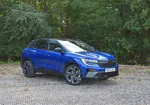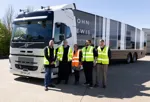Paul Holland, managing director for UK Fuel at Fleetcor
COVID-19 and the subsequent national lockdowns have impacted our lives significantly.
Being forced to stay at home for months on end meant that CO2 emissions dropped to levels not seen for a century as air and road travel grounded to a halt.
It was in this pause that we saw a glimpse of the future and how widespread adoption of electric vehicles (EVs) could benefit our environment.
Throughout 2020, there has been a growing interest in going green from British fleets, with 33,000 pure electric and hybrid cars being registered between April and June, compared with 29,900 diesel vehicles, according to official figures.
In addition, the UK’s network of rapid charging units saw a staggering 363% growth in the last five years alone.
Together, these figures clearly demonstrate that there has been significant momentum gained in the EV movement in recent times, and the UK’s vehicle owners are on board, whether private individuals or businesses.
Harnessing the surge in EV interest
The momentum gained recently is impressive and makes good headway in the Road to Zero movement, which aims to see at least half of new cars as being ultra-low emission by 2030.
This has been bolstered by government initiatives such as changes in company car Benefit in Kind (BIK) tax, but it still isn’t enough.
The UK government must capitalise on these promising developments and help businesses looking to introduce EVs into their fleets.
They should be doing everything possible to ease the vehicle transition for businesses.
Critical to this is ensuring the right infrastructure is in place to allow easy charging across the UK.
It also means providing sufficient incentives to encourage businesses to switch to EVs.
Against the backdrop of lockdown forcing many businesses to close their doors for months on end, and the UK recently entering a recession, this is more important than ever.
From our research, more than a quarter of large businesses are planning to add EVs and other alternatively fuelled vehicles to their fleets by 2021.
And by doing so, there clearly is a future for low emission, low cost, highly efficient transport for employees, goods and services.
Support from fleet partners
We must stress that the responsibility for paving the way for the Road to Zero doesn’t just fall on the Government, all those in the fleet industry must put in a collective effort to make this a reality.
At Allstar, we are making it our mission to support businesses through this adoption by ensuring we provide unique and complete solutions that help standardise payment options across multiple providers.
In launching the Allstar One Electric card, we offer a convenient payment solution for businesses, enabling them to keep their existing fleets on the road, while also enabling them to incorporate electric and hybrid vehicles.
Our multi-branded EV charging network has more than 2,800 charging points across over 1,100 locations throughout the UK to date.
And we make it our promise to continue to grow the electric charging network to ensure all our customers are covered by one card, while having easy access to charging points.
Going green together
It is clear that there is now a tangible shift in attitudes in favour of electric and other alternatively fuelled vehicles.
But we can’t rest on our laurels, as there is still a long way to go before we are able to achieve the goal of a true mass expansion of green vehicle adoption across the country.
We must focus on improving infrastructure to support such a move, dramatically reduce emissions from the vehicles already on the UK’s roads, and drive the uptake of zero emission cars, vans and trucks.
With the right tools and initiatives in place to encourage business owners to make the switch to EV, we can maintain the record-low CO2 emissions seen during lockdown long into the future.

















Login to comment
Comments
No comments have been made yet.